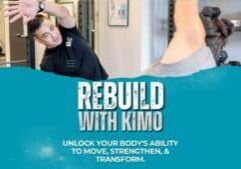Are you getting back into working out and don’t want to get hurt? Try these 5 movement prep techniques first!
Movement Prep is the secret weapon for injury prevention and performance gains for every age, sport, and athletic level.
– Dr. Annie Armstrong
But what is movement prep?? It’s a few simple steps that need to be taken to prepare your body for exercise so you don’t get hurt.
Key Insight: Mobility is the foundation for strength, speed and power.
Most of us work in sedentary jobs and stagnant postures. This lifestyle does not take our joints through their full range of motion.
Research shows that a joint is not fully engaged unless we are going all the way to the end range of joint motion. By taking our joints through that full controlled range of motion, our nervous system understands how to access and make use of our body’s movement ability. This builds mobile joints and resilient connective tissue to keep your body injury-free.
Fast Fact: Your joints have a very limited blood supply. Regular joint mobility bathes them in joint fluid, giving the cartilage much-needed oxygen and nutrients.
5 Essential Prep Techniques
To keep your joints healthy, we recommend a system developed by Dr. Spina, the developer of Functional Range Conditioning.
Dr. Lee Schuster at Head 2 Toe Spine & Sports Therapy is certified in Functional Range Conditioning and recommends the following techniques to assess mobility and maintain joint health.
1.Start Using CARS (Controlled Articular Rotations) Daily
While doing this exercise, remember that sticky spots, clicks and cracks are normal and can be worked through. However, sharp pain or pinching indicates a joint problem that needs to get help.
As you begin, be mindful to not overcompensate your movements. You will notice a general increase in motion after each rotation.
2. Learn to Belly Breathe
We all know how to breathe, right? Yes and no.
Breathing from your diaphragm is essential for core recruitment. Many patients that we see have an altered breathing pattern, perhaps from chronic stress or injury.
This tensed form of breathing recruits accessory muscles and tightens up their neck and upper back. Bracing your abdomen with cues like “suck the belly button to the spine” prevents your diaphragm from descending properly and is counterproductive to stabilizing your spine.
This makes you vulnerable to injury.
When breathing from your core, think about going from the center out. Imagine diaphragmatic breathing like blowing up a balloon, creating pressure from the center first to recruit the abdomen, and then the spinal stabilizers.
3. Fire Your Core
Now that you know how to breathe, you can “fire your core” to increase the stiffness and resilience of your core muscles to prevent injury. Your body is designed for some segments to hold strong while others move freely. Mobility only works when you have something stable to anchor it. That stable thing is your core!
4. Foam Roll and Lacrosse Ball Sore Spots
The value of this simple soft tissue reset cannot be overstated. Work on your own muscles daily to prevent soreness and pain from creeping in as you are starting to work out. Foam rolling will also help increase mobility in your spine and joints, and will greatly reduce your chance of injury.
5. Mindset and Self-limiting beliefs
When getting back into exercise after time away, it can take a while for our bodies to be able to do what they used to do, or we may find limitations our bodies didn’t have before. Try to focus on your growing abilities and the positive ways you are progressing.
Our mind is more powerful than any muscle in our bodies. It can lift us up or tear us down. Be mindful of your self-talk, both in your thoughts and in conversations. Treat yourself like you would a good friend.
The difference between ordinary and extraordinary achievements in all areas of life often comes down to grit and bounce-back ability. Write down or create a mental picture of how your life will be different when you achieve your workout goal and come back to it when encountering fear or doubt. Set small achievable goals to mark your improvement.
Finding a workout buddy gives you accountability to show up, encouragement to keep going, a celebration when reaching goals, and enjoyment along the way.
We are your support team
Whether you are a long-time athlete or a beginner, Head 2 Toe Spine and Sports Therapy is here for you. We treat patients at all levels of fitness.
Our expert team can help you heal from injury, and we are passionate about protecting you against injury in the first place.
Our professional evaluation of your current mobility, hands-on care, and personalized exercises will step up your jump back into movement. Call us at (425) 776-2936 or visit our New Patients page to learn more today.
BONUS #6: DR. ANNIE on the INDUSTRIOUS RADIO SHOW
On the show, they cover how to prep before moving (the secret to activating your joints), how to breathe properly, how to engage the core, how to use a foam roller and how to develop a resilient mindset.
As a special bonus, Dr. Annie has put together instructional videos detailing exactly how to do the tips she covers on the show.
Get a free account to access the videos here:
http://bit.ly/movementprepshow
Setup a free account, log in, go to CrossFit Resources, Industrious Radio Show.
Injury-Proof Your Body: How the REBUILD Program Can Help You Prevent Future Pain and Injury
We all know the frustration of an injury that sidelines us from the activities we love. Whether it’s a nagging backache that keeps you from your favorite sport or a sudden sprain that throws off your daily routine, pain and limitations can significantly impact our quality of life. But what if there was a way…
Read MoreBalancing Act: The Impact of Sports Injury Clinics on Work-Life Balance.
Explore how a sports injury clinic can improve your work-life balance in our blog ‘Balancing Act: The Impact of Sports Injury Clinics on Work-Life Balance’.
Read MoreAre Corrective Exercises Effective in Injury Recovery?
Explore the effectiveness of corrective exercises in injury recovery in our blog ‘Are Corrective Exercises Effective in Injury Recovery?’
Read MoreAdvanced Chiro Rehab Techniques: A Revolution in Pain Management
Discover groundbreaking chiro rehab techniques transforming pain management in our blog ‘Advanced Chiro Rehab Techniques: A Revolution in Pain Management’.
Read MoreUnderstanding the Importance of Spinal Rehab for Back Pain
Discover the crucial role of spinal rehab in managing back pain in our insightful blog ‘Understanding the Importance of Spinal Rehab for Back Pain’.
Read MoreExercises You Can Do at Home after a Visit to the Chiropractic Clinic
Stay active at home with exercises from ‘Exercises You Can Do at Home after a Visit to the Chiropractic Clinic’.
Read More





